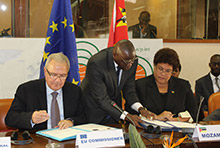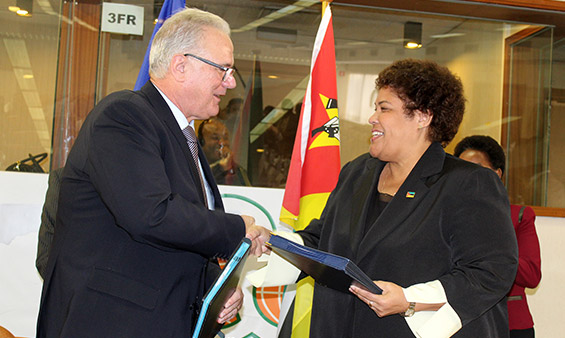Mozambique to receive new EU support
 Brussels, 26 November 2015/ EC/ ACP: European Commissioner for International Cooperation and Development Mr. Neven Mimica on behalf of the European Union, with Hon. Nyeleti Brooke Mondlane, Mozambique's Vice-Minister for Foreign Affairs and Cooperation, signed an agreement at the ACP headquarters in Brussels which will provide €734 million to Mozambique.
Brussels, 26 November 2015/ EC/ ACP: European Commissioner for International Cooperation and Development Mr. Neven Mimica on behalf of the European Union, with Hon. Nyeleti Brooke Mondlane, Mozambique's Vice-Minister for Foreign Affairs and Cooperation, signed an agreement at the ACP headquarters in Brussels which will provide €734 million to Mozambique.
Under the National Indicative Programme (NIP) for Mozambique, this amount will be available for the period until 2020, to support the country in a range of areas, including the promotion of the democratic system in the country, transparency, accountability and the rule of law and support for public institutions, in line with the Government of Mozambique's priorities.
Such NIPs are financed out of the European Development Fund, the EU's development cooperation instrument for African, Caribbean and Pacific (ACP) countries under the ACP-EU Cotonou Partnership Agreement.
During the signing ceremony, Commissioner Mimica said: "There have been significant and positive political and economic developments in Mozambique over the last decades since the end of the civil war in 1992. It is important to build on this progress whilstmaking the best use of Mozambique's impressive economic potential, notably in the sectors of gas, mining, hydro-energy and agriculture. Mozambique could also benefit enormously from its strategic position in Southern Africa. The key issue today is therefore how to make economic growth inclusive and sustainable, while maintaining political stability."
Vice-Minister Mondlane stated that these considerable financial resources will enable Mozambique to implement its 2015-2019 Governance Programme, of which the main focus is improving living standards for Mozambicans in rural and urban areas, in a climate of peace, harmony and tranquility, while consolidating democracy, participatory governance and inclusive, sustainable economic and social development.
An announcement by the European Commission highlighted two areas that will have a particular focus:
Good governance and development. Overall support will be provided to national public policy and its priorities, through a 'Good Governance and Development Contract '(General Budget Support instrument) as well as via complementary measures. EU support in this area will aim at strengthening the capacity of core government systems, control mechanisms, domestic accountability and macroeconomic management. The support from the EU will also help promote a conductive environment to support political and economic governance.
Rural development. In this regard, the EU's support is two-pronged in its approach, to address both inclusive growth and poverty reduction in rural areas. The EU will help to improve food security and nutrition, and on the other hand, to enhance competitiveness amongst producers (through rural electrification and roads for example), in order to foster the conditions for sustainable growth of small and medium-sized enterprises in rural areas.
To strengthen the country's civil society, many projects are also being carried out with financing from the EU via Non-State Actors, local authorities and the European Instrument of Democratisation and Human Rights (EIDHR).
Previous EU support to Mozambique
The National Indicative programme for Mozambique (NIP) from 2007 to 2013 (financied under the 10th Europe Development Fund with a total of €747 million, focused on transport infrastructure and regional integration, as well as on agriculture and rural development to promote sustainable economic growth in rural areas, enhance food security and promote trade flows.
Approximately half of the EU 10th EDF resources were provided through general budget support, sustaining the Mozambique Government’s efforts to ensure progress towards the Millennium Development Goals (MDGs). Under the same programme, the EU also funded additional activities on human rights, justice, anti-corruption, inclusion of NGOs, and trade, as well as Mozambique's health sector.
Mozambique has benefited from its partnership with the European Union with many tangible results, including improved food security. In this regard, in order to buffer the effects of soaring food prices, the EU continues to support the UN's Food and Agriculture Organization (FAO) in improving food security and the livelihood of poor rural agricultural families in Mozambique. 25 thousand farmers have benefitted from subsidised agricultural inputs (seeds and fertilizer) during two consecutive agricultural seasons, leading to an expected 50% increased production of maize and rice. Transport issues and access to services have also been addressed, as projects have allowed the government to improve road infrastructure and reduce transport costs. In a country where electricity is a luxury from which only few can benefit, access to energy projects funded by the EU have allowed the improvement of access to energy sources in rural communities (households, small businesses, schools and health centres) through the supply and installation of photovoltaic energy systems. The EU's efforts have allowed for the electrification of 60 health centres and 120 medical staff houses through solar energy systems.

For more information, please contact:
Josephine LATU-SANFT, ACP Press Office +32 2 7430617, latu@acp.int
Press contacts for the European Commission:
Alexandre POLACK +32 2 299 06 77
Sharon ZARB + 32 2 29 92256
